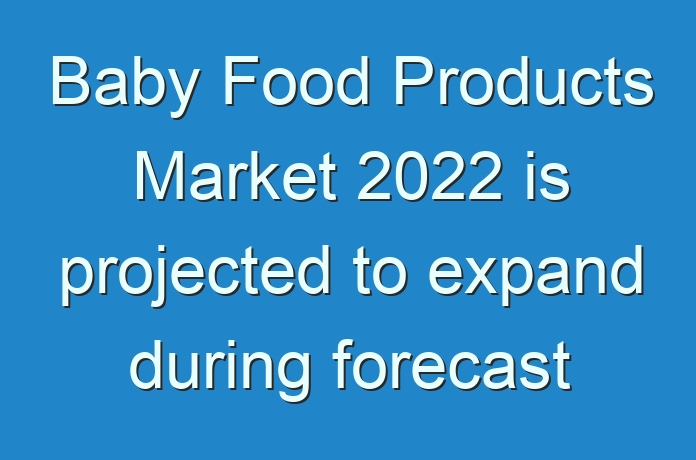
Baby food products are crucial for a baby’s health and nutrition, and for the baby’s early development. Typically, parents start baby food between 4 to 6 months of age. Baby food is easy to consume since it is made for infants to toddlers and is available in several varieties, tastes, and forms. Growing parental concerns about their baby’s nutrition and rising number of working women are encouraging the demand for baby food products. Professionally made baby food products fulfill the nutrition requirement of babies. Rising disposable income of people and changing lifestyles are also anticipated to boost the growth of the baby food products market in the coming years. Growing urbanization is expected to create major opportunities for baby food manufacturers. Emerging countries with high rate of population growth such as India, China, and Brazil are growing markets for business expansion for leading market players. Also, new product development may make the market more attractive.
Baby Food Products Market – Competitive Landscape
The baby food products market is divided into several international and domestic companies. Leading market players are focusing on further innovation in products and regional expansion across the globe to enhance their market share.
- In June 2017, Reckitt Benckiser plc completed its acquisition of Mead Johnson Nutrition. Reckitt Benckiser Group plc is a British multinational consumer goods company with headquarters in Slough, the U.K. Mead Johnson thus became the Infant Formula and Child Nutrition (IFCN) division of Reckitt Benckiser plc.
- Companies involved in the baby food products market focus on business expansion through product innovation and regional expansion. For example, the Hero Group has signed an agreement for a joint venture with Kiviks Marquand, the manufacturer of Queensberry jams, in the Brazil market for business expansion in South America.
Is something restraining your company’s growth in the Baby Food Products Market? Ask for the Report Brochure
Nestlé S.A.
Nestlé S.A. was founded in 1866 through the merger of Anglo-Swiss Milk Company and Farine Lactée Henri Nestlé, established by Henri Nestlé. The company is based in Vevey, Switzerland. Its product portfolio includes baby food, coffee, dairy products, breakfast cereals, bottled water, pet foods, ice creams and others. The company operates across 189 countries and has around 308,000 employees.
Mead Johnson & Company, LLC
Mead Johnson & Company, LLC was established in 1905 and has headquarters in Chicago, Illinois, U.S. The company is active in manufacturing infant formula, both locally and globally with its flagship product namely, Enfamil. It has several brands including Enfagrow, Choco milk, and Lactam.
The Hero Group
The Hero Group is a private, Swiss international consumer food manufacturer and marketing company incorporated in 1886. The company operates in North America, Europe, Middle East & Africa, and Central Asia. It is involved in the production and distribution of infant formula, jam, baby food, and nutritional snack foods.
Several international and domestic players are active in the baby food products industry. These include Abbott Laboratories, Perrigo Company plc, Hain Celestial, FrieslandCampina, The Hero Group, and others.
Baby Food Products Market – Dynamics
Growing parental concern about nutrition for babies
Nowadays, parents are highly concerned about their baby’s nutrition intake. The presence of harmful chemicals such as pesticides, sweeteners, artificial colors etc. in conventional foods consumed by children can cause serious health issues. So the trend is changing and shifting toward food products specific for babies with proper nutrition intake. This growing awareness about avoiding chemicals in food is anticipated to impact the purchasing trend of parents in the coming years, resulting in growth in demand for baby food products owing to their benefits.
Improved distribution channels and demand for organic baby food products
Rapid penetration of internet users, increase in e-commerce sales, and ease of payment options are anticipated to expand the online distribution channel share in sales in the near future. Also, supermarkets and hypermarkets, and specialty stores such as drug stores are witnessing significant growth in demand for baby food products. Parents prefer organic food owing to concerns about side effects of chemicals used in conventional food, which is anticipated to encourage the demand for organic baby food in the coming years.
Looking for Regional Analysis or Competitive Landscape in Baby Food Products Market, Ask for a Customized Report
Baby Food Products Market – Segmentation
The baby food products market can be bifurcated on the basis of:
- Product Type
- Distribution Channel
- Region
Baby Food Products Market Segmentation – By Product Type:
Based on product type, the baby food products market is segmented into:
- Baby Soups
- Frozen Baby Food
- Baby Snacks
- Baby Cereals
- Bottled Baby Foods
Baby Food Products Market Segmentation – By Distribution Channel:
Based on distribution channel, the baby food products market can be divided into:
- Online
- Offline
- Hypermarkets/ Supermarkets
- Specialty Stores
- Small Retail Stores
Read Our Latest Press Release:





